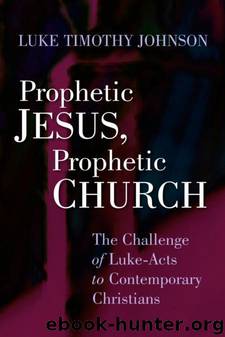Prophetic Jesus, Prophetic Church: The Challenge of Luke-Acts to Contemporary Christians by Luke Timothy Johnson

Author:Luke Timothy Johnson
Language: eng
Format: epub
Published: 2011-11-03T21:08:00+00:00
Power and Possessions
To a disconcerting extent, contemporary Christian discourse about the kingdom involves issues of sexuality. Language about oppression and liberation, forgiveness of sins, judgment and mercy is much more frequently attached to the ways humans act sexually than to the ways they make use of possessions or deploy power. If an earlier era of the church might fairly be called sex-repressed, the contemporary age could be called sex-obsessed. Such interest is understandable simply because the sins of the flesh are so obvious and easily isolated. But the contemporary concentration on sex is far distant from the prophetic concerns of Luke-Acts. In the Gospel narrative, the topic of sex occurs only twice. In Luke 16:18, the prophet Jesus forbids divorce: "Everyone who divorces his wife and marries another commits adultery, and the one who marries a woman divorced from her husband commits adultery." Marriage on earth is to be permanent. But it does not exist in heaven: in response to the trick question of the Sadducees, Jesus declares, "The children of this age marry and remarry; but those who are deemed worthy to attain the coming age and to the resurrection of the dead neither marry nor are given in marriage" (20:34-35). The sins of the "sinful woman of the city" in Luke 7:36-5o are sexual only through the fantasies of Simon the Pharisee and the reader; that the prodigal son spent his living on prostitutes likewise derives from the imagination of the older son.
In sharp contrast, Luke portrays the prophetic vision in terms of the reversal of human norms, above all with respect to wealth and power: the poor are blessed and the hungry are filled; the rich receive woes and the full will be hungry; the powerful will be cast down from their thrones. Whether in the mouth of Mary, of John, of Jesus, or of the apostles (see Acts 1:18-20; 5:1-11; 8:18-23), the kinds of oppression and sin that God most opposes have to do with the abuse of possessions and power. I will elaborate this theme in greater detail in the next chapter, when I consider prophetic embodiment. But even on the basis of what has already been shown to be the prophetic focus, churches today should be moved to ask certain questions.
Why, for example, are Christians' conceptions of sin so concentrated on the weaknesses of the flesh rather than on the willful and predatory practices of economic and political oppression of the weak? Does the church have a prophetic vision with respect to power and possessions that can challenge a world in which both economics and politics are so disordered? Or is the church too often coopted by the world's vision rather than the prophet's in these areas? How can the church challenge the world's use of power when its own structures of authority exhibit the same patterns of self-seeking and exclusion? How can churches today profess to be Christian when their "prosperity gospel" has no connection with the prophetic vision and so obviously mimics
Download
This site does not store any files on its server. We only index and link to content provided by other sites. Please contact the content providers to delete copyright contents if any and email us, we'll remove relevant links or contents immediately.
The Secret Power of Speaking God's Word by Joyce Meyer(3220)
Signature in the Cell: DNA and the Evidence for Intelligent Design by Stephen C. Meyer(3138)
Real Sex by Lauren F. Winner(3023)
The Holy Spirit by Billy Graham(2953)
The Gnostic Gospels by Pagels Elaine(2531)
Jesus by Paul Johnson(2362)
Devil, The by Almond Philip C(2332)
23:27 by H. L. Roberts(2251)
The Nativity by Geza Vermes(2230)
Chosen by God by R. C. Sproul(2164)
All Things New by John Eldredge(2162)
Angels of God: The Bible, the Church and the Heavenly Hosts by Mike Aquilina(1969)
The Return of the Gods by Erich von Daniken(1946)
Angels by Billy Graham(1926)
Knowing God by J.I. Packer(1859)
Jesus of Nazareth by Joseph Ratzinger(1811)
The Gnostic Gospel of St. Thomas by Tau Malachi(1799)
Evidence of the Afterlife by Jeffrey Long(1790)
How To Be Born Again by Billy Graham(1782)
